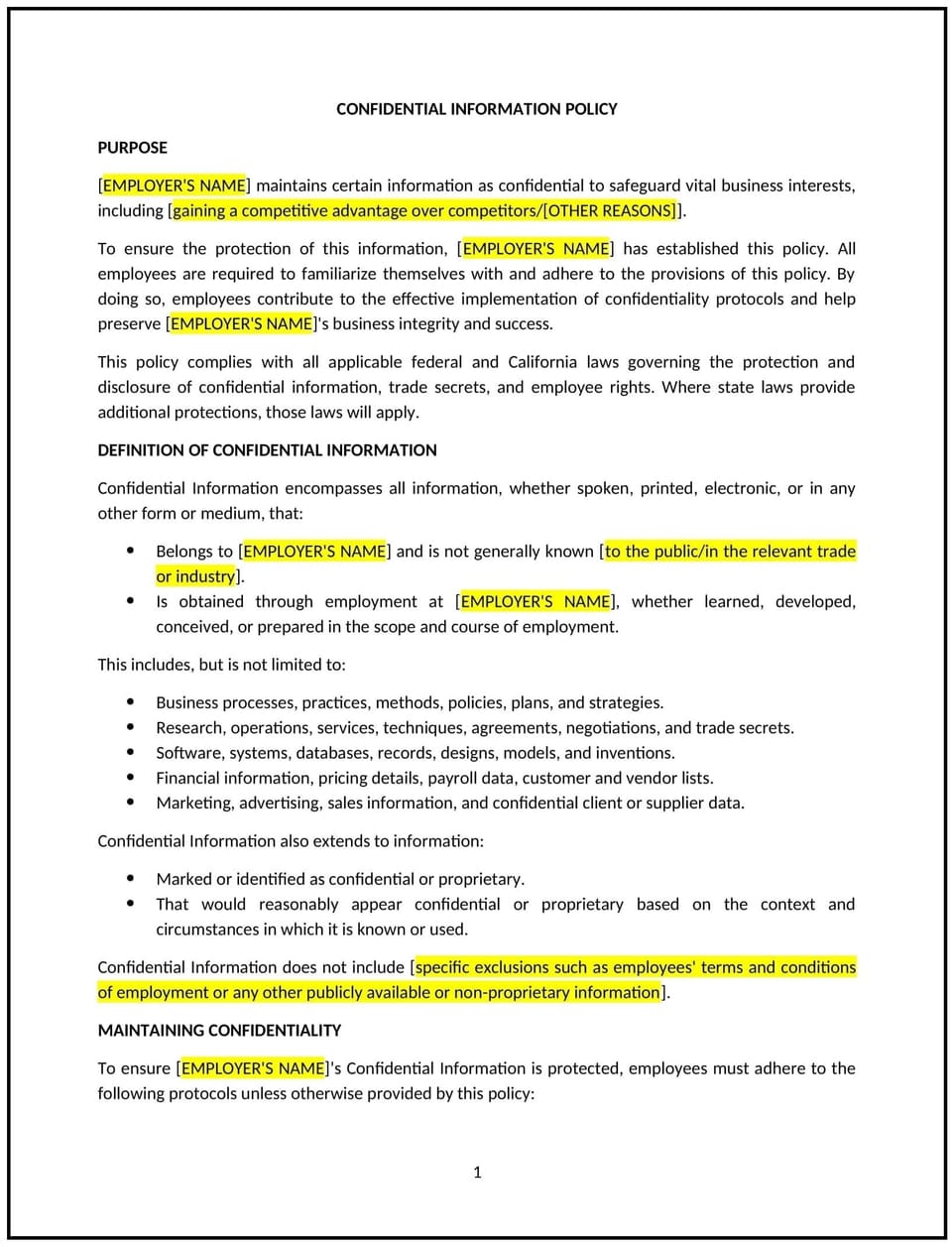Confidential information policy (California): Free template

Confidential information policy (California)
In California, a confidential information policy provides businesses with guidelines for protecting sensitive information from unauthorized access, use, or disclosure. This policy ensures that employees understand their responsibilities in safeguarding business assets, proprietary data, and personal information in compliance with California privacy laws, including the California Consumer Privacy Act (CCPA).
This policy outlines the types of confidential information, acceptable use practices, and the consequences of unauthorized disclosures. By implementing this policy, California businesses can minimize risks and support a culture of security and trust.
How to use this confidential information policy (California)
- Define confidential information: Clearly outline what qualifies as confidential, including trade secrets, client data, and internal business strategies.
- Establish usage guidelines: Specify how employees should handle and protect confidential information, such as secure storage and restricted sharing.
- Address legal obligations: Include references to California privacy laws, such as the CCPA, to ensure compliance with data protection standards.
- Outline reporting procedures: Provide steps for employees to report potential breaches or unauthorized access to confidential information.
- Communicate consequences: Clarify disciplinary actions for violations of the policy, such as termination or legal action.
Benefits of using this confidential information policy (California)
This policy offers several advantages for California businesses:
- Supports compliance: Reflects California privacy laws and industry standards for handling sensitive information.
- Enhances security: Protects business assets and minimizes risks of data breaches or intellectual property theft.
- Builds trust: Demonstrates the business’s commitment to safeguarding client and employee information.
- Encourages accountability: Provides employees with clear guidelines for managing confidential information responsibly.
- Reduces risks: Helps prevent financial losses, reputational harm, and legal disputes caused by unauthorized disclosures.
Tips for using this confidential information policy (California)
- Address California-specific laws: Reflect the requirements of the CCPA and other state regulations in the policy.
- Train employees: Educate staff on best practices for protecting confidential information and the consequences of policy violations.
- Use secure tools: Implement systems and tools to safeguard sensitive information, such as encryption and access controls.
- Monitor compliance: Regularly review information handling practices to identify and address potential risks.
- Review regularly: Update the policy to reflect changes in California laws, workplace technologies, or business needs.
Q: How does this policy benefit the business?
A: This policy supports compliance with California privacy laws, enhances security, and reduces risks of data breaches or unauthorized disclosures.
Q: What types of information are covered under this policy?
A: The policy applies to trade secrets, client data, employee information, financial records, and other sensitive business-related information.
Q: How does this policy support compliance with California laws?
A: The policy reflects the requirements of the CCPA and other state privacy regulations, supporting lawful handling of confidential information.
Q: What steps should employees take to report a potential breach?
A: Employees should notify their manager or designated security contact immediately, providing details about the suspected breach and following reporting procedures.
Q: How can the business minimize risks of unauthorized disclosures?
A: The business can implement secure access controls, provide employee training, and conduct regular audits of information security practices.
This article contains general legal information and does not contain legal advice. Cobrief is not a law firm or a substitute for an attorney or law firm. The law is complex and changes often. For legal advice, please ask a lawyer.


